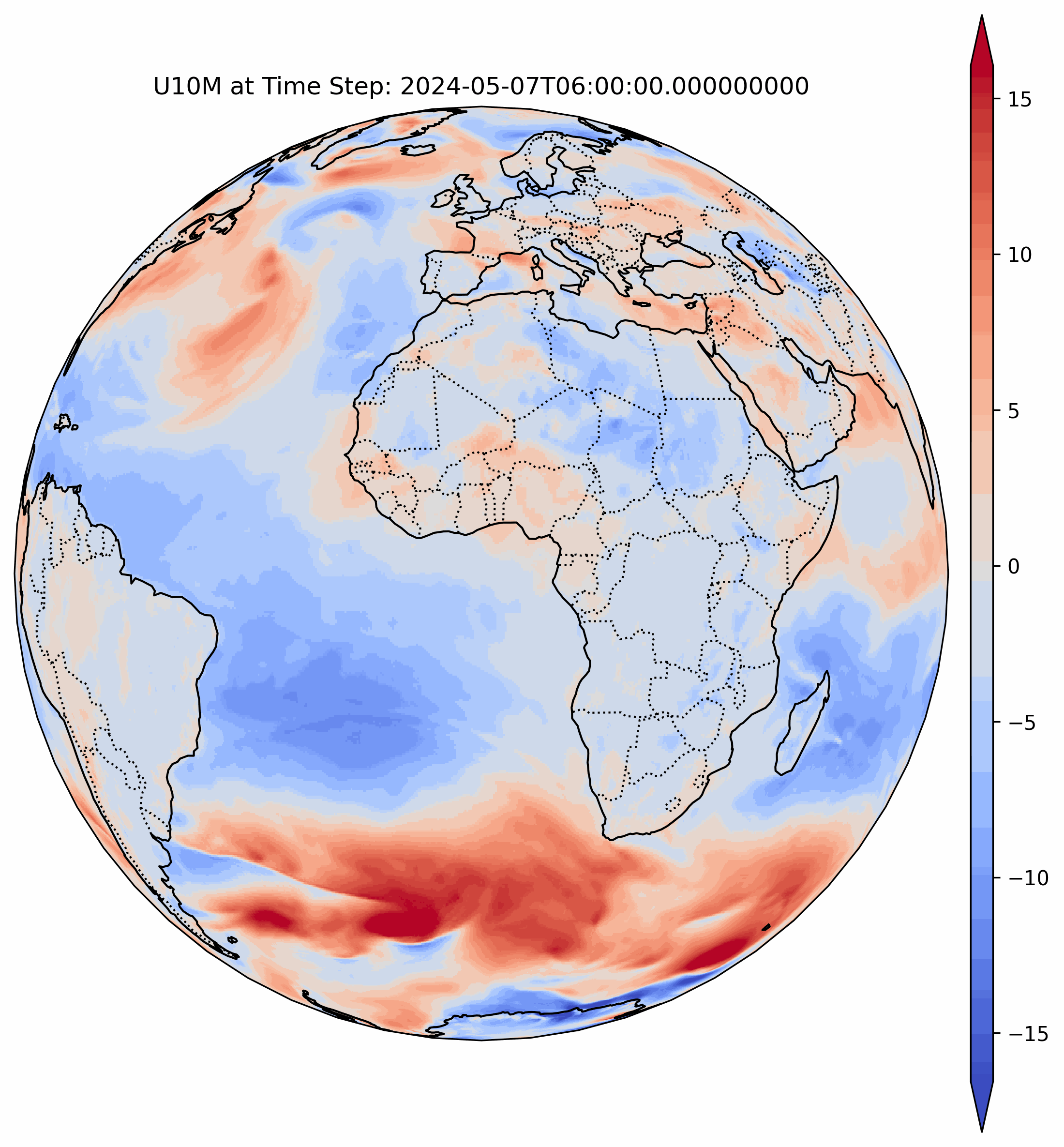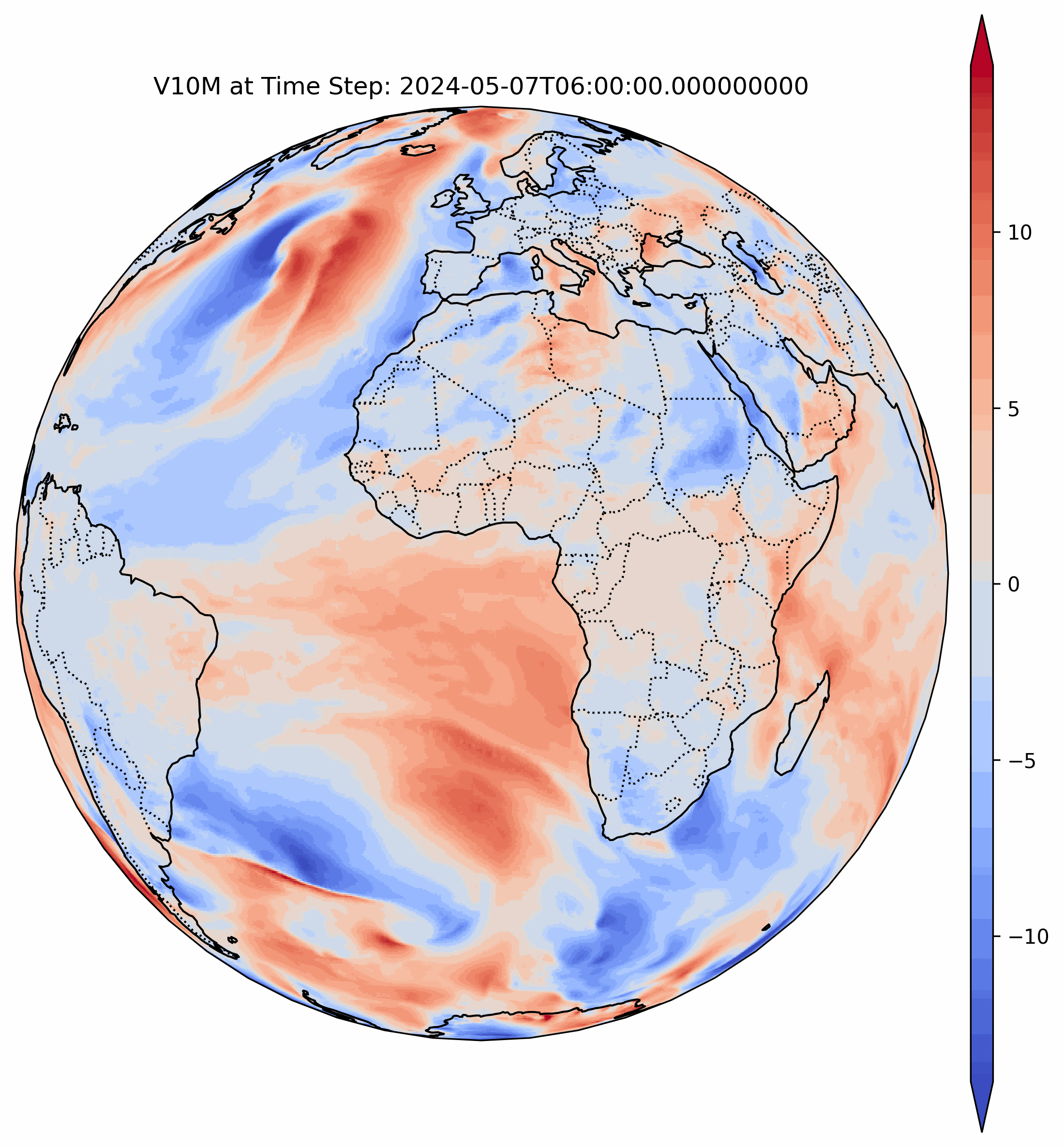🔥 Run state-of-the-art large weather models in less than 2 minutes.
🌪️ Ensemble and fine-tune (soon) to push the limits on forecasting.
🌎 Simulate extreme weather events!
Skyrim allows you to run any large weather model with a consumer grade GPU.
Until very recently, weather forecasts were run in 100K+ CPU HPC clusters, solving massive numerical weather models (NWP). Within last 2 years, open-source foundation models trained on weather simulation datasets surpassed the skill level of these numerical models.
Our goal is to make these models accessible by providing a well maintained infrastructure.
Clone the repo, set an env (either conda or venv) and then run
git clone https://github.com/your-repo/skyrim.git
cd skyrim
pip install .Depending on your use-case (i.e. AWS storage needs or CDS initial conditions), you may need to fill in a .env by cp .env.example .env.
Skyrim currently supports either running on on modal, on a container –for instance vast.ai or bare metal(you will need an NVIDIA GPU with at least 24GB and installation can be long).
Modal is the fastest option, it will run forecasts "serverless" so you don't have to worry about the infrastructure.
You will need a modal key. Run modal setup and set it up (<1 min).
Modal comes with $30 free credits and a single forecast costs about 2 cents as of May 2024.
Once you are all good to go, then run:
modal run skyrim/modal/forecast.pyThis by default uses pangu model to forecast for the next 6 hours, starting from yesterday. It gets initial conditions from NOAA GFS and writes the forecast to a modal volume. You can choose different dates and weather models as shown in here.
After you have your forecast, you can explore it by running a notebook (without GPU, so cheap) in modal:
modal run skyrim/modal/forecast.py::run_analysisThis will output a jupyter notebook link that you can follow and access the forecast. For instance, to read the forecast you can run from the notebook the following:
import xarray as xr
forecast = xr.open_dataset('/skyrim/outputs/[forecast_id]/[filename], engine='scipy')
Once you are done, best is to delete the volume as a daily forecast is about 2GB:
modal volume rm forecasts /[forecast_id] -rIf you don't want to use modal volume, and want to aggregate results in a bucket (currently only s3), you just have to run:
modal run skyrim/modal/forecast.py --output_dir s3://skyrim-devwhere skyrim-dev is the bucket that you want to aggregate the forecasts. By default, zarr format is used to store in AWS/GCP so you can read and move only the parts of the forecasts that you need.
See examples section for more.✌️
If you are running on your own GPUs, installed either via bare metal or via containers such as vast.ai then you can directly get forecasts as such:
from skyrim.core import Skyrim
model = Skyrim("pangu")
final_pred, pred_paths = model.predict(
date="20240507", # format: YYYYMMDD, start date of the forecast
time="0000", # format: HHMM, start time of the forecast
lead_time=24 * 7, # in hours, next week
save=True,
)To visualise the forecast:
from skyrim.libs.plotting import visualize_rollout
visualize_rollout(output_paths=pred_paths, channels=["u10m", "v10m"], output_dir=".")or you can still use the command line:
forecast -m graphcast --lead_time 24 --initial_conditions cds --date 20240330`See examples section for more.✌️
- Find a machine you like RTX3090 or above with at least 24GB memory. Make sure you have good bandwith (+500MB/s).
- Select the instance template from here.
- Then clone the repo and
pip install . && pip install -r requirements.txt
- You will need a NVIDIA GPU with at least 24GB. We are working on quantization as well so that in the future it would be possible to run simulations with much less compute. Have an environment set with Python == 3.10, Pytorch => 2.2.2 and CUDA +12.x. Or if easier start with the docker image:
nvcr.io/nvidia/pytorch:24.01-py3. - Install conda (miniconda for instance). Then run in that environment:
conda create -y -n skyenv python=3.10
conda activate skyenv
./build.shFor each run, you will first pull the initial conditions of your interest (most recent one by default), then the model will run for the desired time step. Initial conditions are pulled from GFS, ECMWF IFS (Operational) or CDS (ERA5 Reanalysis Dataset).
If you are using CDS initial conditions, then you will need a CDS API key in your .env –cp .env.example and paste.
All examples can be run using forecast or modal run skyrim/modal/forecast.py. You just have to make snake case options kebab-case -i.e. model_name to model-name.
Forecast using graphcast model, with ERA5 initial conditions, starting from 2024-04-30T00:00:00 and with a lead time of a week (forecast for the next week, i.e. 168 hours):
forecast --model_name graphcast --initial_conditions cds --date 20240403 -output_dir s3://skyrim-dev --lead_time 168or in modal:
modal run skyrim/modal/forecast.py --model-name graphcast --initial-conditions cds --date 20240403 --output-dir s3://skyrim-dev --lead-time 168Say you re interested in wind at 37.0344° N, 27.4305 E to see if we can kite tomorrow. If we need wind speed, we need to pull wind vectors at about surface level, these are u10m and v10m components of wind. Here is how you go about it:
modal run skyrim/modal/forecast.py --output-dir s3://[your_bucket]/[optional_path] --lead-time 24Then you can read the forecast as below:
import xarray as xr
import pandas as pd
zarr_store_path = "s3://[your_bucket]/[forecast_id]"
forecast = xr.open_dataset(zarr_store_path, engine='zarr') # reads the metadata
df = forecast.sel(lat=37.0344, lon=27.4305, channel=['u10m', 'v10m']).to_pandas()Normally each day is about 2GB but using zarr_store you will only fetch what you need.✌️
Assuming you have a local gpu set up ready to roll:
from skyrim.core import Skyrim
model = Skyrim("pangu")
final_pred, pred_paths = model.predict(
date="20240501", # format: YYYYMMDD, start date of the forecast
time="0000", # format: HHMM, start time of the forecast
lead_time=12, # in hours
save=True,
)
akyaka_coords = {"lat": 37.0557, "lon": 28.3242}
wind_speed = final_pred.wind_speed(**akyaka_coords) * 1.94384 # m/s to knots
print(f"Wind speed at Akyaka: {wind_speed:.2f} knots")- NOAA GFS
- ECMWF IFS
- ERA5 Re-analysis Dataset
Currently supported models are:
- Graphcast
- Pangu
- Fourcastnet (v1 & v2)
- DLWP
- (NWP) ECMWF IFS (HRES) -- notebook
- (NWP) NOAA GFS -- notebook
- (NWP) ICON
- Fuxi
- Nano MetNet
For detailed information regarding licensing, please refer to the license details provided on each model's main homepage, which we link to from each of the corresponding components within our repository.
-
Fuxi: Original
- ensemble prediction
- interface to fetch real-time NWP-based predictions, e.g. via ECMWF API.
- global model performance comparison across various regions and parameters.
- finetuning api that trains a downstream model on top of features coming from a global/foundation model, that is optimized wrt to a specific criteria and region
- model quantization and its effect on model efficiency and accuracy.
This README will be updated regularly to reflect the progress and integration of new models or features into the library. It serves as a guide for internal development efforts and aids in prioritizing tasks and milestones.
All in here ✌️
Skyrim is built on top of NVIDIA's earth2mip and ECMWF's ai-models. Definitely check them out!







